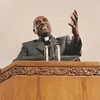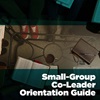I once heard a professor share some wise counsel with a group of preachers: "On Sunday morning, before you ascend to the holy pulpit to preach God's inerrant Word before a waiting, hungry congregation, take a moment to make sure that your pants' zipper isn't down." He knew the main point would be missed if the details were left undone.
Details matter. They matter to God, and they matter to your people. So here are some areas to keep an eye on as you prepare for your cell-group meeting.
Home Atmosphere
We get accustomed to the smells in our homes, but visitors sense them immediately. Pets, things children spill in odd places, heavy perfumes, the evening dinner, and even room deodorizers can irritate noses. You know all about your home. You like its smell. But others might not be so enthusiastic. Think about their noses.
If you have young kids, be sure to dispose of the dirty diapers before the meeting starts or take the hamper of laundry to the washing room. God wants us to be one in Christ, but don't purposely test the oneness of your cell members by allowing strange smells to flood the room. Also, make sure to clean the guest bathroom before the cell group begins. Is there toilet paper, soap, a towel?
Temperature
The temperature in the home increases as more people are packed into a room. Members can become agitated and uncomfortable for the lack of fresh, cool air. If your people must wear heavy coats in your house, although you're in the heat of summer, you probably need to adjust the temperature. The main thing is that you're sensitive to the needs of those in the room. One expert advised that 67 degrees is an ideal temperature for home groups. Common sense is probably a better temperature gauge.
Seating Arrangement
Arrange the seating so each person can see every other person in the group. A circle is the best choice. As the leader, place your chair so that it's on the same level as the rest of those in the group—neither at the focal point nor in the background.
If your house is spacious, it's best to move the chairs into a close circle, thus occupying only a portion of the room. Large rooms may be excellent for large groups, but they kill discussion in small groups. When people are spread far apart (as is the case in large houses), it's harder to openly share thoughts and feelings.
Lighting
The lighting should be bright enough for everyone to read but low enough to feel cozy. If it's too dark, people will have a harder time following the worship sheets and other handouts. You may feel this is unimportant, but details do matter. It's the little things that often make the difference.
Materials
Provide materials for everyone. They'll thank you for it. I've been in small groups where there were only a few song sheets. I shared a song sheet with the person next to me, whom I didn't know. I found myself concentrating more on holding the music steady than on worshiping Jesus. Spend the extra money and make sure everyone has his or her own copy.
Refreshments
Refreshment time isn't something tacked on to small-group ministry. It's a vital part of it. The refreshment time is often the best moment to ask personal questions, enter deeper communion, or even reap the harvest. Some cell groups provide chips and dip during the icebreaker time and after the final prayer. If you can financially afford both, great. If you have to choose, serve refreshments afterwards.
After the meeting, we sometimes serve the people while they're still seated. Most of the time, we stand around the dining room table. This gives the most freedom for people to move around, talk freely, and visit individually. On rare occasions, we'll sit down as a group at the dining room table. Eating refreshments normally lasts about 15 minutes. Afterwards, people will drift out at their own pace. It's the cell leader who sets the tone. If the cell leader is open to it, the people may stay for more than an hour. If the cell leader needs a cut off time, the people will know it. Personally, I think that one hour of talking and sharing is sufficient.
Sensitive cell leaders take advantage of this time to make personal contacts, greet visitors, and reconfirm previous decisions. Be proactive during this time. Don't wait until people come to you. Go to them.
Children in the Cell Group
The ages of the children make a world of difference in how to prepare for them. If children are six or under, they'll need more activities, such as singing, games, visual aids, or videos. This age group will obviously not benefit as much from an adult group. For this reason, some cell groups choose the option of providing reasonably priced childcare (some churches even provide free childcare during the cell time).
My preference is for children to begin experiencing cell life at a young age. Here are a few suggestions on how to make it work:
- Allow the children to stay with the adults for the icebreaker and worship time. During the Word time, the children can receive a personalized Bible lesson directed by one of the cell members (if necessary, the members can rotate in teaching this time). It also works to show a Christian video at this time.
- When the group consistently has four or more children, pray that God will provide an adult or teenager who desires to lead a children's cell group. This might be someone from your own adult cell group or from your church. The children can then meet with their cell leader in a different room of the same house for the entire cell meeting (or at least for the lesson part).
- Another option is to hold small groups for children in various neighborhoods around the city. Adults would lead these small groups. These afternoon cells are a lot like the small groups of Child Evangelism Fellowship.
Distractions
Guard against distractions. Turn off telephone ringers and mute the volume on your answering machine. Put pets in another room or outside. Turn off TV sets, radios, and computers during a meeting. Yes, our lives are busy all the time, but during the one and a half hours of the cell group, you should focus on the cell 100 percent. Don't answer the phone.
What about when your own children—who are supposed to be sleeping—start crying during the cell group? Make sure you and your wife have a strategy for taking care of them. Which of you will leave in the middle of the cell lesson when one of them starts crying? Just make sure one of you is assigned to the task.
Time to Start
A common frustration among small-group leaders is getting everything started on time. It's not unusual to wait five or ten minutes past the scheduled starting time while waiting for cell members to arrive. In such situations, the leader must make a decision. Will the group start on time or wait for the last few members to arrive? Two simple steps can help leaders conquer this age-old problem.
- Agree on expectations. Ask the group what they think about starting on time. This is the ideal time for the group to establish clear expectations and the importance (or unimportance) of group members arriving on time. Most likely, the group members will agree that arriving on time is important. The most critical element is agreement among group members. Remember also that you can continually review this commitment when new people are added.
- Begin on time. Perhaps it seems obvious that the leader should start the group on time when battling chronic lateness. However, as mentioned earlier, many leaders don't start on time because they're waiting for all the participants to arrive. Delaying the beginning of group time sends several mixed signals to group members: 1) "This meeting really doesn't start at 6:30; it starts at 6:45," 2) "It's okay if I arrive late; they won't start without me anyway," or 3) "The first 15 minutes of our meeting isn't important."
If a group leader begins on time regardless of latecomers, he or she is sending the signal that every part of the meeting is important. The leader is also making wise use of the limited time that's available for the meeting. Ultimately, if a small-group leader is in the habit of starting on time, people will arrive on time. Conversely, if a leader does not start on time, the members will arrive later and later.
Time to Close
I don't believe that a small-group meeting should last longer than one and a half hours. I like to say to cell leaders: If you don't strike oil in one and a half hours, stop boring. Cell members have a host of responsibilities, which include going to work, spending time with family, and numerous chores. A cell member might think twice about attending the next week if the meeting is too long.
God's Blessing on Your Home
With all these details, you might feel hesitant about hosting a cell group. But before saying no, consider God's blessing upon your home. When someone opens his home for a cell group, the Spirit of God is invited to reign in that house. God will certainly honor your step of faith and abundantly bless your house and all that you have.
—Joel Comiskey; excerpted from How to Lead a GREAT Cell Group Meeting. Used with permission. Published by TOUCH Publications, Houston, Texas. 1-800-735-5865.









